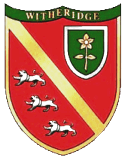

|
Having read the interesting and amusing accounts of the local inhabitants of Witheridge in the recent publication "Witheridge Memories", I am tempted to call my own recollections "The Memories of a visiting Townie". My first visit to Witheridge with my younger brother David was in the early twenties when we were handed over to the care of either Fred or Walter Tidball at the Crown and Sceptre Inn at North Street, Exeter for the long and exciting trip to stay with our grand-parents, Mr and Mrs Herbert John Mansfield at Cannington Cottage, opposite Whitfields bakery. On more than one occasion we had to descend from the toast-rack like coach, with solid tyres, to join the other passengers to push it over the top of the "Long Drag" out of Tiverton. This, of course, added to the excitement of the adventure. Cannington Cottage was an interesting, rambling, four-bedroom house with a delightful walled garden, at the rear of which was a large kitchen garden adjoining Selley's farm. The lawn within the walled garden was well maintained in perfect condition since it also served as grandfather's practice bowling rink. An interesting feature was the pump outside the kitchen door serving the well which produced an unfailing supply of cold fresh water. Grandfather carried on the business of draper and grocer in the adjoining property, later taken over by a Mr Kerslake. He was also manager for Fox Fowler's bank, and a room in the house was set aside for this purpose. The bank, I believe, opened for customers for just two mornings a week. On wet days and to keep us out of the way, we were allowed to play in the "bank room" provided we behaved ourselves and kept will away from the alarm button situated beneath grandfather's knee-hole desk. As very young boys, we found very little to do and perhaps the most interesting event was the arrival and departure of the Witheridge coach in Trafalgar Square. Grandfather, however, did his best to keep us occupied by introducing us to his own particular interests which were quite varied. They included bowls, croquet, weather recording, trout fishing and chess which he played regularly with the Rev. Castlehow (when we were obliged to maintain long periods of silence). We also paid regular visits to the Butter Factory of which grandfather was a director and the original instigator. He was also in demand for his Devonshire dialect readings, and was a friend of A J Coles (Jan Stewer) who joined him in trout fishing. Emily (Kingdom) the house keeper, was like a second grandmother to us and made sure we were kept busy and out of mischief. Our daily task was to help her cleaning and refilling about a dozen oil lamps of various descriptions, table, standard and even hanging from ceilings. My mother, Edith Kate, was the youngest of the Mansfield daughters and was educated in the village school and then at the Middle School (later Bishop Blackall) in Exeter. She lodged with a Mrs Alice Cornish (nee Burgess) and in this way met, and married, her youngest brother, my father, Percy James Burgess on the 7th April 1913. My parents enjoyed long and happy lives for more than ninety years. Mother's sisters Harriet and Margaret both became nurses, Margaret being awarded the Royal Red Cross Decoration (equivalent to the Military Cross) for service in Italy during the 1914-18 war. She endowed a window for Witheridge church porch, and Harriet financed the cost of the children's playing field. My great-aunts were Kate (Partridge) and Harriet (Marie) who lived together in a cottage next to the chapel adjoining Selley's farm. We enjoyed walks with great-aunt Kate because of her keen interest in the countryside. I had not realised that she was known as Kissing Kate. A new experience for us was the Sunday dinner ritual whereby the roast dinner was prepared early in the morning and carried across to Whitfields bakehouse before going to church. After church, the meal was collected, and I believe the cost of baking was just a penny. A somewhat sad occasion for me arose in the early thirties when, as a trainee-accountant, I was involved in the take-over of the Witheridge Transport Company by Greenslades Tours. This ended a very happy era as far as I was concerned. I remember Archie Nott's aerial ropeway and bathing in the Little Dart near New Bridge and Drayford. I also remember most of the twelve Nott children, but particularly Gilbert, Sylvia, Betty and Derek. I wonder how Sylvia reacted at having one of her father's steam engines named after her? I met her in Surrey in 1941 when she was nursing at St. Thomas Hospital (then at Chertsey) while I was on army leave from West Africa. Meeting Bill Williams again at the launching of "Witheridge Memories" reminded me of the happy days camping with the Witheridge Scouts before the war. I remember, among others, Bill Hutchings and Roy Gunn, and of course Mr Castlehow who did so much for the youth of Witheridge. During our teenage years, we cycled from Exeter, always trying to find an easier route but without much success. Our preference, in spite of "Triddleyfoot" and other hindrances, was the road through Sandford, Kennerly, Black Dog and Thelbridge. The road through Tiverton was seven miles longer, and that via Pennymoor and Woolfardisworthy, no easier. We learned to play Tennis at Witheridge at an early age, and in this connection remember Ruby and Olive Baker, the Dudley twin sisters, and their younger sister Marion, who at the age of nine, was I believe my first girlfriend. Our earliest acquaintances, though rather older than us, were Stephen Selley who introduced us to farm life, Winston Maunder, with whom we gathered mushrooms at daybreak and his sister, Dorrie with whom we remained friends until her death a year or two ago. I also remember Winston's grandfather, the Witheridge poet "Vigilo" who wrote the following verses about my parents wedding on the 7th April 1913:- The groom came in a motor,The bride in travelling dress Went down to church as Miss Edith, Came back as Mrs Burgess. When returning from the Altar We freely scattered rice- Said Mrs Smith to Walter "Cor, d'ont'er look awful nice"? The vicar made a pretty speech In accents sweet and mild For, you see, he used to teach Miss Edith as a child May flowers bestrew their path And may Mr and Mrs Burgess Make their home an Eden in Bath. The vicar and teacher referred to in the poem was the Rev. Benson whom I can just remember. On my parents Diamond Wedding Day (7th April 1973) I added the following verse, with apologies to "Vigilo" Now sixty years have run their courseAnd all is just as twas, They're still together bride and groom And Dad is e'er the boss But we can say, as they did say When they freely scattered rice There's little change in the present day, 'er still looks awful nice. Previous Last Edited 03/07/2006 Copyright © 2000-2006 Witheridge Unless otherwise indicated on the page in question, the photographic images reproduced on this site belong to the Witheridge Archives, and, as such may not be reproduced for commercial purposes without written permission. However, you are welcome to use any of the photographs belonging to the archive for personal and/or non-commercial use. Any material shown as not being owned by the archive may not be reproduced in any form without first receiving written permission from the owner of the material in question. |

